poo
1/116
There's no tags or description
Looks like no tags are added yet.
Name | Mastery | Learn | Test | Matching | Spaced |
|---|
No study sessions yet.
117 Terms
prime number
number greater than 1 and only divisible by 1 and themselves
composite number
number with 2+ factors
prime factorization
breaking number into its prime factors
eg. 12 = 2² x 3
LCM
(a x b) / HCF
LCM of 12 & 18 (12 ×18) / 6 = 36
percentage of an amount
percentage X amount /100
eg 20% of 50 = 20× 50/ 100 = 10
percentage increase

sharing parts in a ratio
eg ratio is 2:3
2+3 = 5 so there is 5 parts
if 30 items are shared then 30/5 = 6
so 2 parts = 12
BODMAS
Brackets Order Dividion/Multiply Add/Sub
what is the quadraic formula

midpoint formula
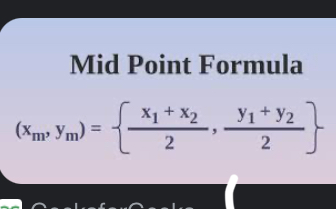
distance firmula
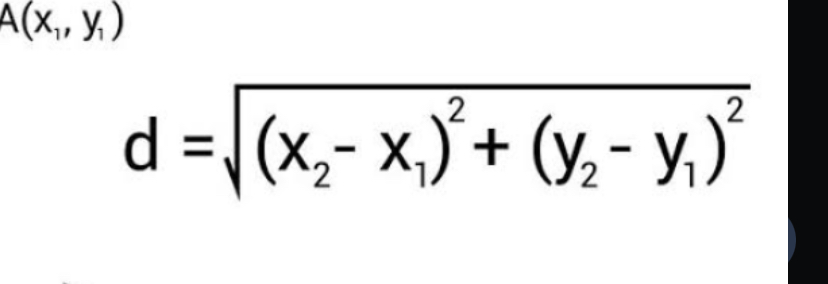
porablola y= (x + 1)²
moves to the left
turning point is (-1, 0)
porabola y= x² + 2
moves up 2
tuning point (0,2)
circle graphs
x² + y² = r²
pecision
relies on small factors like mm or cm
precision not= accuracy (precise measurement can be constanylu wrong)
accuracy
closeness of measurement to true value
formation of solar system
billions of years ago a nebula (huge cloud of dust and gas) collapse . the sun is formed at the centre and remaining material form a protoplanetary disk (dense rotating disk of gas and dust surrounding a newly formed star). The disk particles clinp into planetisimals(building blocks of planets), then planets, moon etc. Terrestial planets formed closer to the sun (small, rocky) hot while gas giants form father out (large gaseous)
general solar system formation
all colar systems form from nebula collapse but the star sizes and disk composition and external factors will be differnt
terrestrial
rocky small and dense
gas giant
gaseous large low density
order planets from sun
mercury, venus, earth, mars, jupiter, saturn, uranus, neptune
my very educated mother just served us noodles
comets
icy bodies with dust and gas ; develops trails when near the sun due to sublimation (solid to gas)
meteor
meteriods small rocky metallic fragments entering earths atmosphere burning up as meteors (“shootjng stars”)
bodies in space
meteors asteroids comets
celestial bodies
stars planets moons asteroids comets meteors
gravity
governs orbits and movement in space
earths motions
rotation (day&night) 24hr , revolution (seasons) 365days
asteroids
rocky metalic orbiting sun, mostly in the asteroid belt. (between mars and jupiter) small and huge
contour lines
lines on a map showing elevation
close lines - steep slope. wide lines- gentle slopes. circrles- hills or depressions
photosynthesis formula
carbon dioxide + water + sun → glucose + oxygen
where does photosynthesis occur
in chloroplasts, using chlorophyll to capture sunlight
what does photosynthesis do
provide energy for plans and oxygen for ecosysems
prokaryotic vs eukaryotic
prokaryotic examples are bacteria, no nucleus
eukaryotic eg. plant/animal, has nucleus
plant vs animal
plant has cell wall, chloroplast, large vacoule
animal cells - no cell wall no chloroplast, small or no vacoule flexibler membrane because no cell wall
ribosome
makes protein
golgi apparatus
packages proteins
ER
rogh ER makes proeins
smooh ER make lipid and cabohydratte
cellmembrane
control what go in and out
cell wall
strcture and support
chlorplast
conduct photosynthesis
xylem
transpor water and minerals
pholem
transports sugars
epidermal
protects plant surfaces
plant tissues
xylem pholem and epidermal
animal tissues
muscle
epithelial
connective
nervous
muscle tissue
enable movementttt
epithelial
covers surfaces (skin)
connective tissue
supports
(bone. blood
sqrt of 3
1.7
1/8
0.125
7/8
0.875
1/3
0.333333333333333333333333333
2/3
0.66666666666666666666
4/3
1.333333333333
group 1
alkali metals
lithium, sodium
HIGHLY REACTIVE, soft
+1 ions
group 17
Halogens
fluorine chlorine
REACTIVE non-metals
-1 ions
group 18
Noble Gases
helium, neon
Non REACTIVE
valence electrons
electrons in the outer shell
trapeium area formula
a+b/2 x h
how to find original price after discount
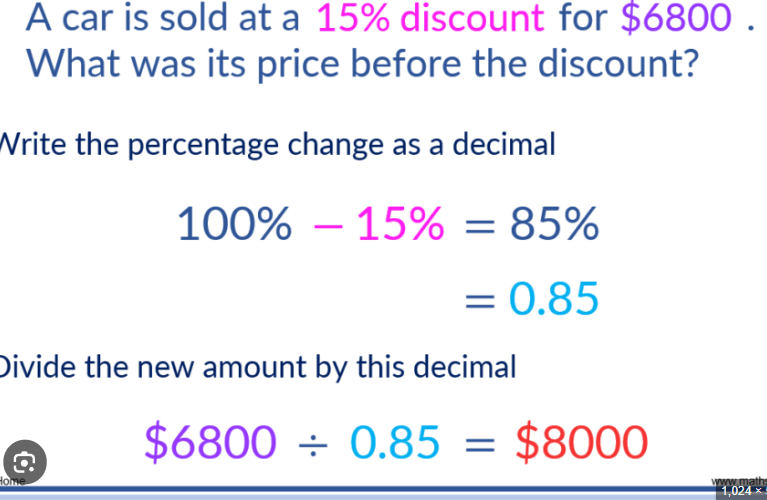
how to find total surface area
area of every face added together
ecosystem roles
primary/secondary consumers, predators, prey decomposer
reproduction
asexual (1 parent) and sexual(2 parent)
nervous tissue
trasmits signals
plant organs
leaves roots and stem
leaves
photosynthesis
roots
absorption of water and nutrients
stems
supports the plant and transports water and nutrients
animal organs
heart lungs and stomach
heart
pumps blood circulatory system
lungs
gas exchange respiratory system
stomach
digestion degestive system
organs
they work in systems
made up of tissues
diffusion
net movement (all) of particles from an area of high to low concentration
osmosis
specific type of diffusion
diffusion of water semi permeable membrane
semi permeable membrane
a membrane that allows certain substances to pass through it while blocking others.
controls transport
chambers of heart
right atrium
right ventricle
left atrium
lift ventricle
heart chambers circulation
receive deoxygenated blood from body
pump deoxygenated blood to lung
receive oxygenated blood from lung
pump oxygenated blood to body
blood flow
body - right atrium - right ventricle - lungs - left atrium - left ventricle - body
heart
pump blood
arteries
carry blood away from heart
vein
carry blood back 2 heart
capillaries
small blood vesels
link between arteries and veins
sum of cubes formula
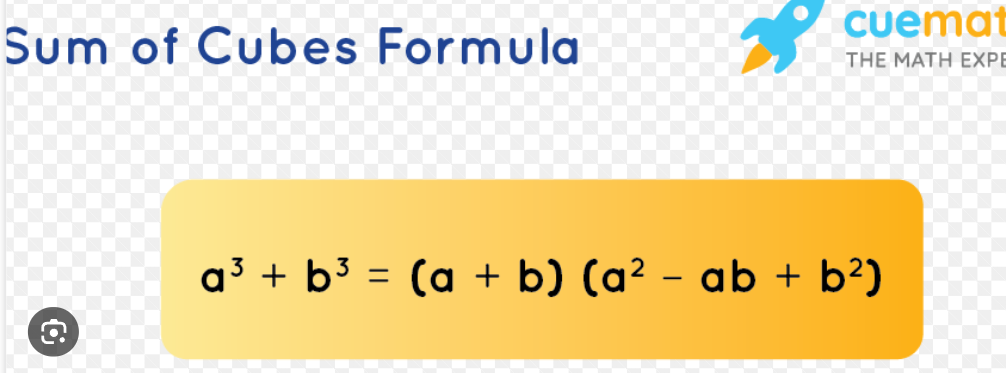
difference of cubes formula
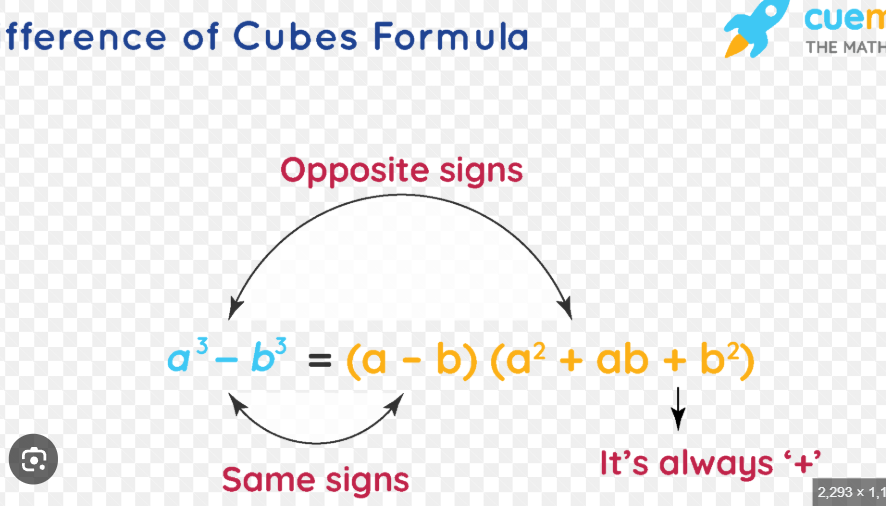
Area of Triangle
½ bh
volume of a prism
b x h
volume pyramid
area x h x 1/3
area circle
pi r squared
area trapezium
½ (a +b ) h
sphere area
4/3 pi r cubed
dependent variable
what you are measuring because of the change
compound
2+ elements
often 2 words
a substance formed when two or more elements are chemically bonded together, like water (H₂O).
element
a substance made of only one type of atom, like hydrogen or oxygen
isotope
atoms with the same no. of protons, diff no. of neutrons
exothermic
release of heat like combustion
heat in the output (reactant
endothermic
absorption heat
food absorb heat when cooking
heat in the input
point slope formula
y - y1 = m( x - x1)
nervous system
releases hormones through neurons
uses neurons and electrical and chemical signals to send messages throughout the body - fast
brain uses nervous system to send messages to the entire body through spinal chord and nerves
circulatory system
(aka the cardiovascular system)
transports blood throughout the body
delivers nutrients and oxygen to all cells in the body
circulates oxygen and removes carbon dioxide